
Your Care Instructions
Cervical disc disease results from damage, disease, or wear and tear to the discs between the bones (vertebra) in your neck. The discs act as shock absorbers for the spine and keep the spine flexible. When a disc is damaged, it can bulge out and press against the nerve roots or spinal cord. This is sometimes called a herniated or "slipped disc." This pressure can cause pain and numbness or tingling in your arms and hands. It can also cause weakness in your legs.
An accident can damage a disc and cause it to break open (rupture). Aging and hard physical work can also cause damage to cervical discs.
The first treatments for cervical disc disease include physical therapy, special neck exercises, heat, and pain medicine. If these fail, your doctor may inject steroids and pain medicine into your neck. Surgery is usually done only if other treatments have not worked.
Follow-up care is a key part of your treatment and safety. Be sure to make and go to all appointments, and call your doctor if you are having problems. It's also a good idea to know your test results and keep a list of the medicines you take.
How can you care for yourself at home?
- Take pain medicines exactly as directed.
- If the doctor gave you a prescription medicine for pain, take it as prescribed.
- If you are not taking a prescription pain medicine, ask your doctor if you can take an over-the-counter medicine.
- Don't spend too long in one position. Take short breaks to move around and change positions.
- Wear a seat belt and shoulder harness when you are in a car.
- Sleep with a pillow under your head and neck that keeps your neck straight.
- Follow your doctor's instructions for gentle neck-stretching exercises.
- Do not smoke. Smoking can slow healing of your discs. If you need help quitting, talk to your doctor about stop-smoking programs and medicines. These can increase your chances of quitting for good.
- Avoid strenuous work or exercise until your doctor says it is okay.
When should you call for help?
Call 911 anytime you think you may need emergency care. For example, call if:
- You are unable to move an arm or a leg at all.
Call your doctor now or seek immediate medical care if:
- You have new or worse symptoms in your arms, legs, belly, or buttocks. Symptoms may include:
- Numbness or tingling.
- Weakness.
- Pain.
- You lose bladder or bowel control.
Watch closely for changes in your health, and be sure to contact your doctor if:
- You do not get better as expected.
Where can you learn more?
Go to http://www.healthwise.net/patientEd
Enter N118 in the search box to learn more about "Cervical Disc Disease: Care Instructions".
Current as of: July 17, 2023
Author: Healthwise Staff
Clinical Review Board
All Healthwise education is reviewed by a team that includes physicians, nurses, advanced practitioners, registered dieticians, and other healthcare professionals.

